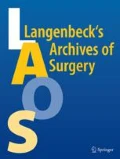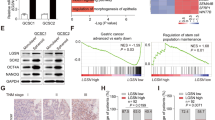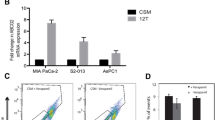Abstract
Purpose
Metastases are a frequent finding in gastric cancer and are associated with poor prognosis. A recently discovered link between metabolic changes, differentiation, and therapy resistance due to tumor stem cells could depict a novel approach in cancer research and therapy. Phosphoglycerate kinase 1 (PGK1) is a metabolic enzyme and is known to be involved in enabling gastric cancer cells to be invasive and to disseminate. In this study, we investigated if PGK1 is a promising candidate in inducing stem cell differentiation in gastric cancer.
Materials and methods
MKN45 gastric cancer cells were used due to their known cancer stem cell population, which is defined by the surface marker CD44. MKN45 cells were separated between CD44+ and CD44− cells and, in equal parts, incubated with shRNA anti-PGK1 using fluorescence-activated cell sorting (FACS) analysis; they were then injected into nude mice to evaluate their tumor growth behavior in vivo. Further, the invasive potential of gastric cancer cells was evaluated in vitro using the xCelligence analyzing system.
Results
CD44+ gastric cancer cells treated with and without shRNA anti-PGK1 were capable to cause tumor growth in vivo, whereas tumor growth in CD44+ cells treated with shRNA anti-PGK1 was considerably smaller in comparison with that in CD44+ cells without treatment. CD44− cells did not show any noticeable tumor growth in vivo. By targeting PGK1, the invasive potential of gastric cancer cells was impressively reduced in vitro. In all our cells, which were targeted with shRNA anti-PGK1, we did not find any change that is in accordance with the phenotype of the cells using FACS analysis.
Conclusions
Our findings suggest that targeting the key metabolic enzyme PGK1 in gastric cancer cells may open a new chapter in cancer treatment, which is well worth for further exploration in combination with recent chemotherapy, and might be a promising possibility to overcome therapy resistance in gastric cancer.




Similar content being viewed by others
References
Hanahan D, Weinberg RA (2000) The hallmarks of cancer. Cell 100(1):57–70
Rosen JM, Jordan CT (2009) The increasing complexity of the cancer stem cell paradigm. Science 324(5935):1670–1673
Lapidot T, Sirard C, Vormoor J, Murdoch B, Hoang T, Caceres-Cortes J, Minden M, Paterson B, Caligiuri MA, Dick JE (1994) A cell initiating human acute myeloid leukaemia after transplantation into SCID mice. Nature 367(6464):645–648
Visvader JE, Lindeman GJ (2008) Cancer stem cells in solid tumours: accumulating evidence and unresolved questions. Nat Rev Cancer 8(10):755–768
Sullivan JP, Minna JD, Shay JW (2010) Evidence for self-renewing lung cancer stem cells and their implications in tumor initiation, progression, and targeted therapy. Cancer Metastasis Rev 29(1):61–72
Tennant DA, Duran RV, Boulahbel H, Gottlieb E (2009) Metabolic transformation in cancer. Carcinogenesis 30(8):1269–1280
Warburg O, Wind F, Negelein E (1927) The metabolism of tumors in the body. J Gen Physiol 8(6):519–530
Bracha AL, Ramanathan A, Huang S, Ingber DE, Schreiber SL (2010) Carbon metabolism-mediated myogenic differentiation. Nat Chem Biol 6(3):202–204
Wang J, Zhou J, Wu GS (2007) ERK-dependent MKP-1-mediated cisplatin resistance in human ovarian cancer cells. Cancer Res 67(24):11933–11941
Duan Z, Lamendola DE, Yusuf RZ, Penson RT, Preffer FI, Seiden MV (2002) Overexpression of human phosphoglycerate kinase 1 (PGK1) induces a multidrug resistance phenotype. Anticancer Res 22(4):1933–1941
Hwang T, Liang Y, Chien K, Yu J (2006) Overexpression and elevated serum levels of phosphoglycerate kinase 1 in pancreatic ductal adenocarcinoma. Proteomics 6(7):2259–2272
Zhang D, Tai LK, Wong LL, Chiu L, Sethi SK, Koay ESC (2005) Proteomic study reveals that proteins involved in metabolic and detoxification pathways are highly expressed in HER-2/neu-positive breast cancer. Mol Cell Proteomics 4(11):1686–1696
Zieker D, Konigsrainer I, Traub F, Nieselt K, Knapp B, Schillinger C, Stirnkorb C, Fend F, Northoff H, Kupka S, Brucher BLDM, Konigsrainer A (2008) PGK1 a potential marker for peritoneal dissemination in gastric cancer. Cell Physiol Biochem 21(5–6):429–436
Zieker D, Konigsrainer I, Tritschler I, Loffler M, Beckert S, Traub F, Nieselt K, Buhler S, Weller M, Gaedcke J, Taichman RS, Northoff H, Brucher BLDM, Konigsrainer A (2010) Phosphoglycerate kinase 1 a promoting enzyme for peritoneal dissemination in gastric cancer. Int J Cancer 126(6):1513–1520
Zieker D, Konigsrainer I, Weinreich J, Beckert S, Glatzle J, Nieselt K, Buhler S, Loffler M, Gaedcke J, Northoff H, Mannheim JG, Wiehr S, Pichler BJ, von Weyhern C, Brucher BLDM, Konigsrainer A (2010) Phosphoglycerate kinase 1 promoting tumor progression and metastasis in gastric cancer - detected in a tumor mouse model using positron emission tomography/magnetic resonance imaging. Cell Physiol Biochem 26(2):147–154
Takaishi S, Okumura T, Tu S, Wang SSW, Shibata W, Vigneshwaran R, Gordon SAK, Shimada Y, Wang TC (2009) Identification of gastric cancer stem cells using the cell surface marker CD44. Stem Cells 27(5):1006–1020
Warburg O (1956) On the origin of cancer cells. Science 123(3191):309–314
Heddleston JM, Li Z, McLendon RE, Hjelmeland AB, Rich JN (2009) The hypoxic microenvironment maintains glioblastoma stem cells and promotes reprogramming towards a cancer stem cell phenotype. Cell Cycle 8(20):3274–3284
Petrie K, Zelent A, Waxman S (2009) Differentiation therapy of acute myeloid leukemia: past, present and future. Curr Opin Hematol 16(2):84–91
Acknowledgments
We thank Dr. Bühring und Ms. Treml for their kindness in providing the FACS analysis system and their help in supporting our study.
Conflicts of interest
This manuscript contains original material that has not been published or submitted to any other journal. The authors declare no competing conflict of interest.
Author information
Authors and Affiliations
Corresponding author
Rights and permissions
About this article
Cite this article
Zieker, D., Bühler, S., Üstündag, Z. et al. Induction of tumor stem cell differentiation—novel strategy to overcome therapy resistance in gastric cancer. Langenbecks Arch Surg 398, 603–608 (2013). https://doi.org/10.1007/s00423-013-1058-5
Received:
Accepted:
Published:
Issue Date:
DOI: https://doi.org/10.1007/s00423-013-1058-5




